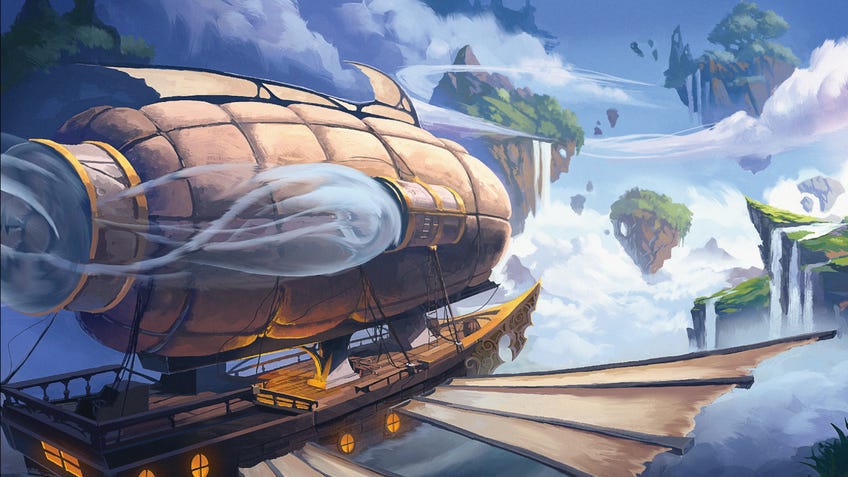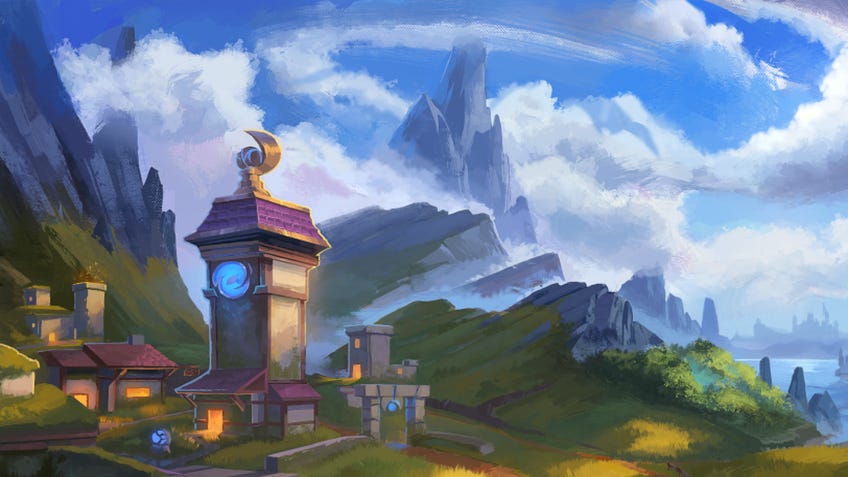Design degistif: Apothecaria creator Anna Blackwell discusses creating a commentary for her solo RPG
Potent potables.
I spent my first weeks as the town’s fledgling hedge witch curing a lumberjack cursed with hamster lycanthropy. After that, the librarian came down with a dragon hoarding sickness and began stealing every book she could find. My third patient had simply cut themselves while adventuring, and I suspect they were keen on seeing me for personal reasons.
Such is the flow of Apothercaria, a solo journaling RPG by designer Anna Blackwell (Delve, Rise, Umbra) where players forage the environs for the ingredients needed to concoct potions that will cure a range of magical maladies. Doing so earns them money and goodwill, raising their social stock with the townsfolk of High Rannoc and providing funds to eventually expand the player’s capabilities, a la Stardew Valley and similar pastoral RPG video games.
Blackwell recently spoke to Dicebreaker following the release of a commentary track for Apothecaria that outlines thought processes, reflections and appreciation for her own puns, running alongside the game’s full text. It’s an interesting and earnest look into the process of creating one of Zinequest 3’s most successful projects, and something Blackwell believe can benefit everyone.
Tell me about the process. Was it an easy one? What sort of emotions did it dredge up?
Anna Blackwell: So when I first started, it took me maybe three separate sittings over three days to do it. The first time I was like, right, let's just be kind of funny and jokey about it. You know, talk about how indulgent it is. But as I started getting into it and started taking it more seriously, I realized a lot of places I could look at my own work, consider it against the kind of design pillars I had going in, and ask if this actually reached what I wanted it to do.
It's good to look back and see where I failed, but then also at the successes. I'm fairly certain I have managed to make the game essentially vegan - you can get through it without hurting an animal. It was really interesting to like, go back and really dive into that portion of it. British people very much 'do not show pride', stiff upper lip. When I've worked with Americans on projects, you guys are very much taught that you're the best, while we’re told to shut up; pipe down.
How much time did you spend designing Apothecaria?
I think the core mechanics were probably two days, and then it was just spending time coming up with all the different events. I think every table took me maybe a day of work. So, probably two or three months - I work quite slowly compared to a lot of other RPG designers I know. And I think it's because I'm coming at it from a video game-ish point of view where things need to be balanced, they need to be tested, they need to make sure it all flows, while I know a lot of my contemporaries are quite loath to playtest anything.
Have you always been the sort of designer to whom playtesting is important?
I started game design by going through university and doing computer game development. So, I was taught a very specific way to make games. When I came over to tabletop, I was like, okay, you make games by first doing the pre design, then your game design document, make a game, and then you go take it to playtesters - they point at where it's broken.
I've always done it that way, and I'm really glad I did because when I made Delve,that was a very intense simulation game. Passed that out to people, and they're like, here's the million ways it doesn't work. Thankfully, Apothecaria was a lot less detailed in that way. But even then, it was so good to pass it to playtesters and realize where I've completely missed things that I thought were obvious.
Players have been posting their experiences with Apothecaria online. Did those public reports affect your commentary by dint of having this readily available stream of opinions and reactions?
It's important to open up and let your emotions be seen. Love what you make and show people that love.
Oh, yeah, definitely. It made me feel confident, seeing that people had immediately picked it up and ran with it exactly how I intended. This is your game, now. You have it. If you want to make changes, you go make changes. So, people took it, and they started making spreadsheets of all the ailments and reagent tags because they're quite modern witches. They want everything laid out nice and neat. Someone went and made an app, which is so cool.
Who is the audience for the commentary track? Is it primarily for you, the designer, to reflect and learn from? Or is it to give players a different and more personal way of engaging with the game?
I think it's definitely the latter. I’m trying to give people something they can engage with, and see the thoughts behind it. That’s closely, very closely followed by giving me something to go through an entire game on design, and then very closely behind that is something for other game designers to come and see how I've approached this design.
I've ended up massively into mushrooms. Just by going through and creating a game about the natural world I ended up getting so deep into foraging that my partner got me a foraging basket. We started going out into the woods to identify plants and mushrooms, and it's amazing to take a step back, go into nature and really see what's around us. I didn't realize you could make hats and dynamite stuffing out of mushrooms. And like it makes some amazing tinder! It's incredible the kind of plants we've got just hiding around.

There's a couple of sections in the commentary where you talk about filling up empty space and this need to put things in blanks. What’s your broad approach to physical game books?
I think the whole trying to fill empty space as much as they can comes from an idea of value. It's a 60 page book, and it's £15 - I want to make sure you get as much game as I can possibly give you. But as I'm getting a bit more confident in myself as a designer I'm starting to allow white space to come into it a bit more. I can leave space for art to make it look nicer. I don't have tremendously solid ideas on design because I am so new to layout. Delve, Rise and Umbra were just straightforward text documents, basically. They had some tables and some art placed around but like, very, very basic. Apothecaria is my first attempt to really make something look nice.
So much of Apothecaria can be ignored if the player is simply interested in treating it as a therapeutic or rhythmic journaling exercise. That seems to be by design.
I think optional mechanics that let you tailor the experience to yourself is exactly what I've been trying to design. Because Delve had more time out and alive, I can show that more. I have the idea that Delve was the core experience, and then I've released optional things like hunger, necromancy and things like that to keep adding more complexity where you can mix and match. With Apothecaria I definitely like being able to give people that investment to engage with as much or as little as you want.
It made me feel confident, seeing that people had immediately picked it up and ran with it exactly how I intended.
What have you learned from doing this commentary track? What’s the wisdom you can impart from this process, either to players or designers?
No matter how small it seems to you, someone's going to find it interesting. It's important to open up and let your emotions be seen because no one wants to read this glib, ‘look at my shit little game’ thing. Love what you make and show people that love.
When I say investing emotionally in your games, I mean game design can be an amazing way to kind of change your own head. When I started Apothecaria I wasn't in the best place mentally. I was really deep into this whole RPG scene, but everything around me was depressing. It's The Artifact dealing with abandonment, and The Wretched dealing with hopelessness. So I was like, You know what? Let's go all out, full happy. Putting that together, making this game and seeing the massively positive response to it has definitely been a way to kind of get out of that bad place.

